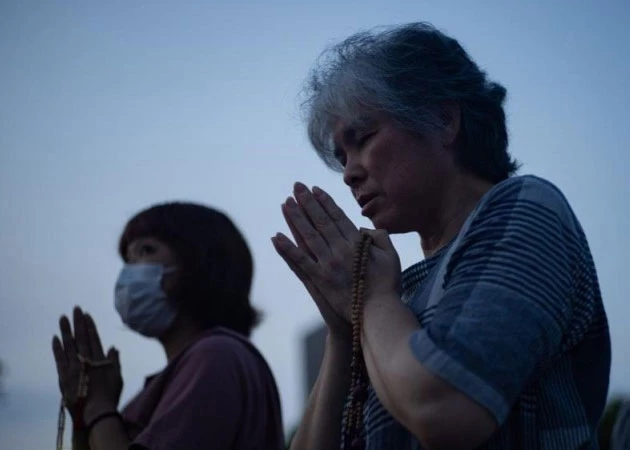Eighty years after atomic bombings of Hiroshima and Nagasaki: a lesson from the past that must never be repeated
August 6 marks the 80th anniversary of the atomic bombing of Hiroshima, Japan. Three days later is the commemoration of the victims of the second atomic bomb dropped on Nagasaki.
 |
| People commemorate the victims at Hiroshima Peace Memorial Park in Hiroshima City, Japan on August 6, 2024. (Photo: Xinhua) |
Eighty years after the devastating nuclear attacks, stories from survivors of the tragedy continue to remind the world of the painful lessons from the past that must not be repeated.
Hiroshima, August 6, 1945, seven-year-old Michiko Kodama was standing near her desk right next to the classroom window, wondering whether to run outside or seek shelter. Then a flash of lightning - gold, orange, silver - something indescribable. The window shattered. She crawled under the table and lost consciousness.
The first atomic bomb used in war destroyed a large area in Hiroshima and killed about 135,000 people, marking one of the darkest pages in human history. Three days after the bomb devastated Hiroshima, the second atomic bomb was dropped on Nagasaki.
Japan calls the survivors of the two atomic bombings of Hiroshima and Nagasaki in 1945 and radiation-affected individuals as hibakusha. Kazumi Kuwahara, 29, a hibakusha (third generation descendant of atomic bomb survivor), has been battling illness throughout her twenties. Even from the moment she was born, doctors said she would not live more than three days.
The stories of Michiko Kodama and Kazumi Kuwahara outline the severe consequences of the nuclear disaster. Many hibakusha even feel that the atomic bombing 80 years ago has not ended, and they continue to live in the dark. Their confessions are also a warning of an unpredictable disaster if the world does not continue to make efforts to heal the current rifts. In particular, the conflict in Ukraine has entered its fourth year, and tensions could escalate at any time due to a hasty decision by the parties or a mistake in calculation.
Meanwhile, regarding the conflict in the Middle East, the world is still worried about the risk of fighting getting out of control and turning into a widespread war.
The knots and conflicts have not been resolved, while the security mechanisms that have maintained global peace for decades are weakening. From the stalled disarmament talks in Geneva (Switzerland), to the soaring military budget, the momentum no longer seems to be towards eliminating or reducing weapons. Instead, many experts are concerned about signs of rearmament.
At the Conference on Disarmament in Geneva in February 2025, UN Secretary-General Antonio Guterres stressed that bilateral and regional security agreements, which have been the foundation of global peace and stability for decades, are gradually being eroded. Trust between countries is declining, while instability, insecurity, and military spending are increasing. These factors are undermining the “spirit of mutual restraint”, which helps prevent the risk of tension and conflict escalation.
While the peaceful foundation is being shaken, artificial intelligence, which is a breakthrough achievement of humanity, is being “weaponised” at an alarming rate. According to the head of the UN, signs of a new arms race have appeared, even in outer space. In that context, the world continues to call on countries to fulfil their commitments on disarmament and non-proliferation agreed upon at previous conferences.
NDO





READER COMMENTS